Email Newsletter
Receive free lesson plans, printables, and worksheets by email:

Critical Thinking Worksheets
- Brain Teasers - A great way to stimulate thinking. Don't worry, they come complete with answer keys.
- Compare and Contrast - Students examine differences and similarities in a variety situations.
- Dictionary Practice Worksheets - Practice your dictionary skills.
- Fact And Opinion - Students determine the validity of a body of work.
- How Many Are There? - Fun activities for examining patterns.
- Internet Search Worksheets - Fun Internet searches for students.
- Logic Puzzle - Each scenario is thought provoking. Lots of brain power needed here.
- Making Predictions - A good warm-up for inferences.
- Mazes - Your run-of-the-mill start and finish mazes.
- Name People That ...- Good creative thinking exercises.
- Name Places That ...- Good creative thinking exercises.
- Name Things That ...- Good creative thinking exercises.
- Secret Code - Students answer riddles through secret codes.
- Study Skills Worksheets - Great for test preparation.
- Sorting and Classifying - Great for meeting national standards.
- What Do You Remember? - A visual memory activity.
Activities That Improve Student Critical Thinking
Critical thinking is perhaps the most important skill we need. It is paramount not just for job success but also for making the best decisions in crucial life matters.
As an educator, you should explain to your students that almost all our mistakes can be attributed to a lack of critical thinking. You can pick just about any big blunder you made in the past. You will invariably find that it transpired because of a failure to think critically.
Remember, the best thing you can do as a teacher is to inculcate a strong sense of critical thinking in your students.
Here are the activities that will help students to develop critical thinking.
Discuss Cognitive Biases
There are myriad cognitive biases.
The fact of the matter is we succumb to these biases at some point in our lives. Hence, it pays to study these biases.
You can pick those biases you think are the most detrimental and insidious. You should then explain them to your students to learn to identify and avoid these biases.
Perhaps the most dangerous bias by far is the Optimism bias. It may sound rather innocuous because of the word ‘optimism’. However, it is far more sinister in reality.
Optimism bias tends to think that bad things won't happen to us - they will happen to others only. For example, many think they won't suffer a fatal car crash. Hence, some get involved in overspeeding and texting while driving despite knowing their perils. No wonder these two reckless acts are the main reasons for fatal car crashes.
Writing About Biases
After elucidating various biases and providing simple examples to help them grasp these concepts, you can instruct your students to write about adverse events in their lives when they succumbed to these biases.
What did you learn? What were the consequences? These are further questions you can ask.
Talking about one’s mistakes is never easy. It is hard to concede that we are wrong at times. However, if we want to become better human beings and find success, we must learn from our mistakes. But the first step entails admitting one’s mistakes.
This will also instill humility and reduce overconfidence.
Avoiding Biases – The Easy Way
All biases and ensuring blunders are avoidable with one simple trick.
It just takes one word to get smarter – “why”. That is, you should question everything. As simple as that.
In particular, you should question all that you do and think.
Write it down first whenever you are about to take action or form an opinion about something. Then in front of it, just write “why?” You can then brainstorm and write for and against the idea in logical points.
If you make this a regular habit, you will avoid many mistakes and regrets. You will also maximize positive returns from your decisions.
Explain It to a 6-Year Old
This is something that can greatly benefit students in their academic endeavors.
We are inclined to think that we understand what has been just said. But just nodding along is not enough. You should be able to explain it to others.
The good news is that this goes far beyond altruism. In truth, it is self-empowerment. When you explain an abstruse concept to others, you bolster your own understanding of the same. Reiterating something embeds it more deeply into your long-term memory.
The social factor may also be beneficial and fruitful.
Do Your Research
Teach students to challenge common perceptions and conventional wisdom.
Explain carefully that this entails walking a fine line. You don't want to be dismissive, nor do you want to be naive. Instead, you should have an open mind and a willingness to do your research carefully.
Inform students about consulting reliable online sources. Explain that it is best to consider multiple authentic sources. Don't be satisfied with just the first entry in Google search results.
Here's how you can instill the importance of research in your students.
Instruct your students to research air pollution in the US. Those who do their research more meticulously will find that indoor air pollution is far deadlier than outdoor air pollution.
Tell them that they found out this key health fact courtesy of research. You can further instruct them to find ways of mitigating these risks.
Motivate your students to do research by telling them that they will be pleasantly surprised at the wealth of knowledge that they can uncover via dedicated research.
Beware of Disinformation
Disinformation is ubiquitous these days. It has become a weapon of choice for bad actors ranging from rogue states to unscrupulous individuals.
Critical thinking can help dispel misinformation and prevent you from becoming its victim.
You should help kids to detect and deal with weapons of mass distraction.
There was a time when fake news was disseminated largely via social media.
It is being spread by state-sponsored groups masquerading as legitimate media outlets on the internet. The scope and scale of these fake news campaigns are staggering to say the least.
One such fake news campaign involved no less than 750 fake sites posing as media outlets. Disinformation from this notorious racket reached millions around the globe and even found its way to UN and European Parliament meetings.
You can instruct kids in your class to do a project on internet disinformation, complete with case studies. You should also tell them to write about all possible ways to spot fakes and scams.
Bottom Line
Shown above are the activities to develop critical thinking in students.
You might agree that cultivating this key ability in your students is one of the best things you did for them.

The Critical Thinking Workbook - Games and Activities for Developing CRITICAL THINKING SKILLS - Free Printable PDF Workbook
Download The Critical Thinking Workbook - Games and Activities for Developing CRITICAL THINKING SKILLS - Free Printable PDF Workbook
Jump start your critical thinking skills by using this handy free printable PDF workbook. Our friends over at Global Digital Citizen Foundation have provided this free learning resource for your education and enjoyment. With lessons, exercises and activities to keep you on track, you'll be able to gain powerful critical thinking skills and begin your transformation!
The activity pages in the Critical Thinking Workbook are meant to be shared and explored. Use it as an electronic document or as worksheets. You can either print off the pages and use them as activity sheets, or you can edit them directly right in the document on your computer. There are also Answer Keys for the activities that need them provided at the back of the book. Now, go get thinking!
This Printable PDF Workbook is immediately available for FREE download.
By downloading and using this product, you understand and agree to the following terms of use. The information, including but not limited to, text, graphics, images and other material contained in this product are for educational, informational and entertainment purposes only.
No material on this site is intended to be a substitute for professional medical or mental health advice, diagnosis or treatment. Always seek the advice of your physician or other qualified health care provider with any questions you may have regarding a medical condition or treatment and before undertaking a new health care regimen, and never disregard professional medical advice or delay in seeking it because of something you have read or seen on this website.
This is not a physical printed product and is not physically shipped. “Shipped” on the product email means virtually shipped and available for download. You have an implied license to print this digital file and use it for your own personal purpose. Commercial reselling or distribution of this product is strictly prohibited.
http://www.leapfroggingsuccess.com website is currently under development and will be relaunched soon. Any references made to this website can be redirected to https://critical3academy.teachable.com .
If you have any issues with downloading your product, please email leapfroggingsuccess [!at] gmail.com and we will resolve your issue right away.
Explore related searches
#criticalthinking
#criticalspeaking
#criticallearning
#cognitivebias
#cognitivedistortions
#conspiracytheories
#defensemechanisms
#logicalfallacies
#superstitions
#intelligence
#personalities
#psychology
#philosophy
#flashcards

Choose a Pricing Option

Critical Thinking Worksheets

A Total Of 15

Connect The Dots

Count The Squares

Proving Your Belief

What You Learned

Choose A Prompt

Narrative Parallels

Real-Life Applications

Dissecting A Print Ad

A Philosophical Inquiry

Beyond The Surface

Simplify The Problem

Explain Your Reasoning

Looking For Fallacies
About these 15 worksheets.
Critical thinking is the ability to analyze, evaluate, and synthesize information, ideas, and arguments in a thoughtful and systematic manner. These worksheets provide exercises, questions, and prompts that encourage learners to engage in higher-order thinking and develop their abilities to assess, reason, and make well-informed decisions.
Critical thinking worksheets are like tools for your brain! They help you practice thinking in different ways and finding answers to tough questions. They are pages filled with fun activities and exercises that make your brain work a little harder. These worksheets help you learn how to think about things from different angles, ask questions, and find the best answers.
When you learn to think in different ways, school becomes more fun. You start seeing connections between things you learn, and you become a super thinker! It’s like being a detective, always searching for answers and clues.
Types of Exercises
Comparing and Contrasting
These exercises will have you look at two things and find out how they’re the same or different. For example, you might get pictures of a cat and a dog. You’ll write down how they are alike (like both have tails) and how they’re different (like dogs usually bark, and cats meow).
Cause and Effect
These activities make you think about what might happen because of something else. Imagine if you saw a picture of a melted ice cream cone on the sidewalk. The worksheet might ask, “Why did the ice cream melt?” You’d think about the reasons, like maybe it was a hot day.
These exercises will ask you to put things in order. Let’s say you get pictures showing a seed, a young plant, and a big tree. Your job would be to put them in the right order, from the seed growing up to the tree.
Predictions
With these, you’ll guess what might happen next. Maybe there’s a story about a boy who’s holding an umbrella while looking at dark clouds. The worksheet might ask, “What will he do next?” And you’d guess, “He’ll open the umbrella because it might rain.”
Problem and Solution
Here, you’ll read about a problem and think of ways to solve it. Like, if there’s a story about a girl who keeps losing her pencils, you might suggest she gets a pencil case.
Riddles are fun questions or puzzles that make you think hard. An example of a riddle is, “What comes down but never goes up?” The answer? Rain!
Grouping and Categorizing
In these activities, you’ll put things into groups based on how they’re alike. For example, you might get pictures of a car, a bicycle, a fish, and a boat. You’d group the car and bicycle together because they’re ways to travel on land. The fish and boat can be grouped as things related to water.
Making Connections
This helps you link what you already know to new things. If you read a story about a girl who’s sad because her balloon flew away, you might remember a time you felt sad and understand how she feels.
Ask Questions
Some worksheets will have a story or picture, and then you’ll come up with questions about it. Like, if there’s a picture of a forest, you might ask, “What animals live there?” or “Why are forests important?”
How to Help Foster Student Critical Thinking Skills
Improving critical thinking skills in students is a fundamental role of educators, as these skills equip students to analyze, evaluate, and synthesize information in a reasoned manner. To begin with, teachers should cultivate a classroom environment that values questions over answers.
Encouraging students to ask “why” and “how” helps them delve deeper into topics and challenges their preconceived beliefs. Incorporating problem-based learning into the curriculum is another effective approach. By presenting students with real-world problems, they learn to apply their knowledge, analyze situations, and come up with solutions.
Regularly engaging students in debates or discussions on diverse topics can also sharpen their ability to think on their feet, consider different viewpoints, and defend their perspectives with evidence. Furthermore, teachers should emphasize the importance of reflection. After tasks or discussions, providing opportunities for students to reflect on their thinking process can foster self-awareness of their cognitive habits.
Assigning projects that require evaluating information from various sources also helps. In a digital age where misinformation is rampant, teaching students to discern credible from non-credible sources is crucial.
Promoting metacognition-thinking about one’s thinking—can be transformative. By making students conscious of their thought processes and guiding them in recognizing biases, assumptions, or logical fallacies, educators empower them to become more discerning and independent thinkers. In essence, fostering critical thinking is about providing students with tools to think clearly and rationally, equipping them for challenges both inside and outside the classroom.
How it works
Transform your enterprise with the scalable mindsets, skills, & behavior change that drive performance.
Explore how BetterUp connects to your core business systems.
We pair AI with the latest in human-centered coaching to drive powerful, lasting learning and behavior change.
Build leaders that accelerate team performance and engagement.
Unlock performance potential at scale with AI-powered curated growth journeys.
Build resilience, well-being and agility to drive performance across your entire enterprise.
Transform your business, starting with your sales leaders.
Unlock business impact from the top with executive coaching.
Foster a culture of inclusion and belonging.
Accelerate the performance and potential of your agencies and employees.
See how innovative organizations use BetterUp to build a thriving workforce.
Discover how BetterUp measurably impacts key business outcomes for organizations like yours.
Daring Leadership Institute: a groundbreaking partnership that amplifies Brené Brown's empirically based, courage-building curriculum with BetterUp’s human transformation platform.

- What is coaching?
Learn how 1:1 coaching works, who its for, and if it's right for you.
Accelerate your personal and professional growth with the expert guidance of a BetterUp Coach.
Types of Coaching
Navigate career transitions, accelerate your professional growth, and achieve your career goals with expert coaching.
Enhance your communication skills for better personal and professional relationships, with tailored coaching that focuses on your needs.
Find balance, resilience, and well-being in all areas of your life with holistic coaching designed to empower you.
Discover your perfect match : Take our 5-minute assessment and let us pair you with one of our top Coaches tailored just for you.
Find your coach
-1.png)
Research, expert insights, and resources to develop courageous leaders within your organization.
Best practices, research, and tools to fuel individual and business growth.
View on-demand BetterUp events and learn about upcoming live discussions.
The latest insights and ideas for building a high-performing workplace.
- BetterUp Briefing
The online magazine that helps you understand tomorrow's workforce trends, today.
Innovative research featured in peer-reviewed journals, press, and more.
Founded in 2022 to deepen the understanding of the intersection of well-being, purpose, and performance
We're on a mission to help everyone live with clarity, purpose, and passion.
Join us and create impactful change.
Read the buzz about BetterUp.
Meet the leadership that's passionate about empowering your workforce.

For Business
For Individuals

How to develop critical thinking skills

Jump to section
What are critical thinking skills?
How to develop critical thinking skills: 12 tips, how to practice critical thinking skills at work, become your own best critic.
A client requests a tight deadline on an intense project. Your childcare provider calls in sick on a day full of meetings. Payment from a contract gig is a month behind.
Your day-to-day will always have challenges, big and small. And no matter the size and urgency, they all ask you to use critical thinking to analyze the situation and arrive at the right solution.
Critical thinking includes a wide set of soft skills that encourage continuous learning, resilience , and self-reflection. The more you add to your professional toolbelt, the more equipped you’ll be to tackle whatever challenge presents itself. Here’s how to develop critical thinking, with examples explaining how to use it.
Critical thinking skills are the skills you use to analyze information, imagine scenarios holistically, and create rational solutions. It’s a type of emotional intelligence that stimulates effective problem-solving and decision-making .
When you fine-tune your critical thinking skills, you seek beyond face-value observations and knee-jerk reactions. Instead, you harvest deeper insights and string together ideas and concepts in logical, sometimes out-of-the-box , ways.
Imagine a team working on a marketing strategy for a new set of services. That team might use critical thinking to balance goals and key performance indicators , like new customer acquisition costs, average monthly sales, and net profit margins. They understand the connections between overlapping factors to build a strategy that stays within budget and attracts new sales.
Looking for ways to improve critical thinking skills? Start by brushing up on the following soft skills that fall under this umbrella:
- Analytical thinking: Approaching problems with an analytical eye includes breaking down complex issues into small chunks and examining their significance. An example could be organizing customer feedback to identify trends and improve your product offerings.
- Open-mindedness: Push past cognitive biases and be receptive to different points of view and constructive feedback . Managers and team members who keep an open mind position themselves to hear new ideas that foster innovation .
- Creative thinking: With creative thinking , you can develop several ideas to address a single problem, like brainstorming more efficient workflow best practices to boost productivity and employee morale .
- Self-reflection: Self-reflection lets you examine your thinking and assumptions to stimulate healthier collaboration and thought processes. Maybe a bad first impression created a negative anchoring bias with a new coworker. Reflecting on your own behavior stirs up empathy and improves the relationship.
- Evaluation: With evaluation skills, you tackle the pros and cons of a situation based on logic rather than emotion. When prioritizing tasks , you might be tempted to do the fun or easy ones first, but evaluating their urgency and importance can help you make better decisions.
There’s no magic method to change your thinking processes. Improvement happens with small, intentional changes to your everyday habits until a more critical approach to thinking is automatic.
Here are 12 tips for building stronger self-awareness and learning how to improve critical thinking:
1. Be cautious
There’s nothing wrong with a little bit of skepticism. One of the core principles of critical thinking is asking questions and dissecting the available information. You might surprise yourself at what you find when you stop to think before taking action.
Before making a decision, use evidence, logic, and deductive reasoning to support your own opinions or challenge ideas. It helps you and your team avoid falling prey to bad information or resistance to change .
2. Ask open-ended questions
“Yes” or “no” questions invite agreement rather than reflection. Instead, ask open-ended questions that force you to engage in analysis and rumination. Digging deeper can help you identify potential biases, uncover assumptions, and arrive at new hypotheses and possible solutions.
3. Do your research
No matter your proficiency, you can always learn more. Turning to different points of view and information is a great way to develop a comprehensive understanding of a topic and make informed decisions. You’ll prioritize reliable information rather than fall into emotional or automatic decision-making.

4. Consider several opinions
You might spend so much time on your work that it’s easy to get stuck in your own perspective, especially if you work independently on a remote team . Make an effort to reach out to colleagues to hear different ideas and thought patterns. Their input might surprise you.
If or when you disagree, remember that you and your team share a common goal. Divergent opinions are constructive, so shift the focus to finding solutions rather than defending disagreements.
5. Learn to be quiet
Active listening is the intentional practice of concentrating on a conversation partner instead of your own thoughts. It’s about paying attention to detail and letting people know you value their opinions, which can open your mind to new perspectives and thought processes.
If you’re brainstorming with your team or having a 1:1 with a coworker , listen, ask clarifying questions, and work to understand other peoples’ viewpoints. Listening to your team will help you find fallacies in arguments to improve possible solutions.
6. Schedule reflection
Whether waking up at 5 am or using a procrastination hack, scheduling time to think puts you in a growth mindset . Your mind has natural cognitive biases to help you simplify decision-making, but squashing them is key to thinking critically and finding new solutions besides the ones you might gravitate toward. Creating time and calm space in your day gives you the chance to step back and visualize the biases that impact your decision-making.
7. Cultivate curiosity
With so many demands and job responsibilities, it’s easy to seek solace in routine. But getting out of your comfort zone helps spark critical thinking and find more solutions than you usually might.
If curiosity doesn’t come naturally to you, cultivate a thirst for knowledge by reskilling and upskilling . Not only will you add a new skill to your resume , but expanding the limits of your professional knowledge might motivate you to ask more questions.
You don’t have to develop critical thinking skills exclusively in the office. Whether on your break or finding a hobby to do after work, playing strategic games or filling out crosswords can prime your brain for problem-solving.

9. Write it down
Recording your thoughts with pen and paper can lead to stronger brain activity than typing them out on a keyboard. If you’re stuck and want to think more critically about a problem, writing your ideas can help you process information more deeply.
The act of recording ideas on paper can also improve your memory . Ideas are more likely to linger in the background of your mind, leading to deeper thinking that informs your decision-making process.
10. Speak up
Take opportunities to share your opinion, even if it intimidates you. Whether at a networking event with new people or a meeting with close colleagues, try to engage with people who challenge or help you develop your ideas. Having conversations that force you to support your position encourages you to refine your argument and think critically.
11. Stay humble
Ideas and concepts aren’t the same as real-life actions. There may be such a thing as negative outcomes, but there’s no such thing as a bad idea. At the brainstorming stage , don’t be afraid to make mistakes.
Sometimes the best solutions come from off-the-wall, unorthodox decisions. Sit in your creativity , let ideas flow, and don’t be afraid to share them with your colleagues. Putting yourself in a creative mindset helps you see situations from new perspectives and arrive at innovative conclusions.
12. Embrace discomfort
Get comfortable feeling uncomfortable . It isn’t easy when others challenge your ideas, but sometimes, it’s the only way to see new perspectives and think critically.
By willingly stepping into unfamiliar territory, you foster the resilience and flexibility you need to become a better thinker. You’ll learn how to pick yourself up from failure and approach problems from fresh angles.

Thinking critically is easier said than done. To help you understand its impact (and how to use it), here are two scenarios that require critical thinking skills and provide teachable moments.
Scenario #1: Unexpected delays and budget
Imagine your team is working on producing an event. Unexpectedly, a vendor explains they’ll be a week behind on delivering materials. Then another vendor sends a quote that’s more than you can afford. Unless you develop a creative solution, the team will have to push back deadlines and go over budget, potentially costing the client’s trust.
Here’s how you could approach the situation with creative thinking:
- Analyze the situation holistically: Determine how the delayed materials and over-budget quote will impact the rest of your timeline and financial resources . That way, you can identify whether you need to build an entirely new plan with new vendors, or if it’s worth it to readjust time and resources.
- Identify your alternative options: With careful assessment, your team decides that another vendor can’t provide the same materials in a quicker time frame. You’ll need to rearrange assignment schedules to complete everything on time.
- Collaborate and adapt: Your team has an emergency meeting to rearrange your project schedule. You write down each deliverable and determine which ones you can and can’t complete by the deadline. To compensate for lost time, you rearrange your task schedule to complete everything that doesn’t need the delayed materials first, then advance as far as you can on the tasks that do.
- Check different resources: In the meantime, you scour through your contact sheet to find alternative vendors that fit your budget. Accounting helps by providing old invoices to determine which vendors have quoted less for previous jobs. After pulling all your sources, you find a vendor that fits your budget.
- Maintain open communication: You create a special Slack channel to keep everyone up to date on changes, challenges, and additional delays. Keeping an open line encourages transparency on the team’s progress and boosts everyone’s confidence.

Scenario #2: Differing opinions
A conflict arises between two team members on the best approach for a new strategy for a gaming app. One believes that small tweaks to the current content are necessary to maintain user engagement and stay within budget. The other believes a bold revamp is needed to encourage new followers and stronger sales revenue.
Here’s how critical thinking could help this conflict:
- Listen actively: Give both team members the opportunity to present their ideas free of interruption. Encourage the entire team to ask open-ended questions to more fully understand and develop each argument.
- Flex your analytical skills: After learning more about both ideas, everyone should objectively assess the benefits and drawbacks of each approach. Analyze each idea's risk, merits, and feasibility based on available data and the app’s goals and objectives.
- Identify common ground: The team discusses similarities between each approach and brainstorms ways to integrate both idea s, like making small but eye-catching modifications to existing content or using the same visual design in new media formats.
- Test new strategy: To test out the potential of a bolder strategy, the team decides to A/B test both approaches. You create a set of criteria to evenly distribute users by different demographics to analyze engagement, revenue, and customer turnover.
- Monitor and adapt: After implementing the A/B test, the team closely monitors the results of each strategy. You regroup and optimize the changes that provide stronger results after the testing. That way, all team members understand why you’re making the changes you decide to make.
You can’t think your problems away. But you can equip yourself with skills that help you move through your biggest challenges and find innovative solutions. Learning how to develop critical thinking is the start of honing an adaptable growth mindset.
Now that you have resources to increase critical thinking skills in your professional development, you can identify whether you embrace change or routine, are open or resistant to feedback, or turn to research or emotion will build self-awareness. From there, tweak and incorporate techniques to be a critical thinker when life presents you with a problem.
Understand Yourself Better:
Big 5 Personality Test
Elizabeth Perry, ACC
Elizabeth Perry is a Coach Community Manager at BetterUp. She uses strategic engagement strategies to cultivate a learning community across a global network of Coaches through in-person and virtual experiences, technology-enabled platforms, and strategic coaching industry partnerships. With over 3 years of coaching experience and a certification in transformative leadership and life coaching from Sofia University, Elizabeth leverages transpersonal psychology expertise to help coaches and clients gain awareness of their behavioral and thought patterns, discover their purpose and passions, and elevate their potential. She is a lifelong student of psychology, personal growth, and human potential as well as an ICF-certified ACC transpersonal life and leadership Coach.
How divergent thinking can drive your creativity
What’s convergent thinking how to be a better problem-solver, 8 creative solutions to your most challenging problems, critical thinking is the one skillset you can't afford not to master, can dreams help you solve problems 6 ways to try, how emotions affect learning: the impact of emotions, what is lateral thinking 7 techniques to encourage creative ideas, 17 memorization techniques to sharpen your memory & recall, how different learning styles make a difference at work, betterup named a 2019 “cool vendor” in human capital management: enhancing employee experience by gartnerup your game: a new model for leadership, 7 critical teamwork skills and how to develop them, what is creative thinking and how can i improve, 6 big picture thinking strategies that you'll actually use, what are analytical skills examples and how to level up, stay connected with betterup, get our newsletter, event invites, plus product insights and research..
3100 E 5th Street, Suite 350 Austin, TX 78702
- Platform Overview
- Integrations
- Powered by AI
- BetterUp Lead™
- BetterUp Manage™
- BetterUp Care®
- Sales Performance
- Diversity & Inclusion
- Case Studies
- Why BetterUp?
- About Coaching
- Find your Coach
- Career Coaching
- Communication Coaching
- Personal Coaching
- News and Press
- Leadership Team
- Become a BetterUp Coach
- BetterUp Labs
- Center for Purpose & Performance
- Leadership Training
- Business Coaching
- Contact Support
- Contact Sales
- Privacy Policy
- Acceptable Use Policy
- Trust & Security
- Cookie Preferences
- Call for Volunteers!
- Our Team of Presenters
- Fellows of the Foundation
- Dr. Richard Paul
- Dr. Linda Elder
- Dr. Gerald Nosich
- Contact Us - Office Information
- Permission to Use Our Work
- Create a CriticalThinking.Org Account
- Contributions to the Foundation for Critical Thinking
- Testimonials
- Center for Critical Thinking
- The National Council for Excellence in Critical Thinking
- International Center for the Assessment of Higher Order Thinking
- Library of Critical Thinking Resources
- Professional Development
- Inservice Information Request Form
- Certification Online Course
- The State of Critical Thinking Today
- Higher Education
- K-12 Instruction
- Customized Webinars and Online Courses for Faculty
- Business & Professional Groups
- The Center for Critical Thinking Community Online
- Certification in the Paul-Elder Approach to Critical Thinking
- Professional Development Model - College and University
- Professional Development Model for K-12
- Workshop Descriptions
- Online Courses in Critical Thinking
- Critical Thinking Training for Law Enforcement
- Consulting for Leaders and Key Personnel at Your Organization
- Critical Thinking Therapy
- Conferences & Events
- Upcoming Learning Opportunities
- 2024 Fall Academy on Critical Thinking
- Daily Schedule
- Transportation, Lodging, and Social Functions
- Academy Presuppositions
- Save the Date: 45th Annual International Conference on Critical Thinking
- Presuppositions of the Conference
- Call for Proposals
- Conference Archives
- 44th Annual International Conference on Critical Thinking
- Focal Session Descriptions
- Guest Presentation Program
- Presuppositions of the 44th Annual International Conference on Critical Thinking
- Recommended Reading
- 43rd Annual International Conference on Critical Thinking
- Register as an Ambassador
- Testimonials from Past Attendees
- Thank You to Our Donors
- 42nd Annual International Conference on Critical Thinking
- Overview of Sessions (Flyer)
- Presuppositions of the Annual International Conference
- Testimonials from Past Conferences
- 41st Annual International Conference on Critical Thinking
- Recommended Publications
- Dedication to Our Donors
- 40th Annual International Conference on Critical Thinking
- Session Descriptions
- Testimonials from Prior Conferences
- International Critical Thinking Manifesto
- Scholarships Available
- 39th Annual International Conference on Critical Thinking
- Travel and Lodging Info
- FAQ & General Announcements
- Focal and Plenary Session Descriptions
- Program and Proceedings of the 39th Annual International Conference on Critical Thinking
- The Venue: KU Leuven
- Call for Critical Thinking Ambassadors
- Conference Background Information
- 38th Annual International Conference on Critical Thinking
- Call for Ambassadors for Critical Thinking
- Conference Focal Session Descriptions
- Conference Concurrent Session Descriptions
- Conference Roundtable Discussions
- Conference Announcements and FAQ
- Conference Program and Proceedings
- Conference Daily Schedule
- Conference Hotel Information
- Conference Academic Credit
- Conference Presuppositions
- What Participants Have Said About the Conference
- 37th Annual International Conference on Critical Thinking
- Registration & Fees
- FAQ and Announcements
- Conference Presenters
- 37th Conference Flyer
- Program and Proceedings of the 37th Conference
- 36th International Conference
- Conference Sessions
- Conference Flyer
- Program and Proceedings
- Academic Credit
- 35th International Conference
- Conference Session Descriptions
- Available Online Sessions
- Bertrand Russell Distinguished Scholar - Daniel Ellsberg
- 35th International Conference Program
- Concurrent Sessions
- Posthumous Bertrand Russell Scholar
- Hotel Information
- Conference FAQs
- Visiting UC Berkeley
- 34th INTERNATIONAL CONFERENCE
- Bertrand Russell Distinguished Scholar - Ralph Nader
- Conference Concurrent Presenters
- Conference Program
- Conference Theme
- Roundtable Discussions
- Flyer for Bulletin Boards
- 33rd INTERNATIONAL CONFERENCE
- 33rd International Conference Program
- 33rd International Conference Sessions
- 33rd International Conference Presenters
- The Bertrand Russell Distinguished Scholars Critical Thinking Conversations
- 33rd International Conference - Fees & Registration
- 33rd International Conference Concurrent Presenters
- 33rd International Conference - Hotel Information
- 33rd International Conference Flyer
- 32nd INTERNATIONAL CONFERENCE
- 32nd Annual Conference Sessions
- 32nd Annual Conference Presenter Information
- 32nd Conference Program
- The Bertrand Russell Distinguished Scholars Critical Thinking Lecture Series
- 32nd Annual Conference Concurrent Presenters
- 32nd Annual Conference Academic Credit
- 31st INTERNATIONAL CONFERENCE
- 31st Conference Sessions
- Comments about previous conferences
- Conference Hotel (2011)
- 31st Concurrent Presenters
- Registration Fees
- 31st International Conference
- 30th INTERNATIONAL CONFERENCE ON CRITICAL THINKING
- 30th International Conference Theme
- 30th Conference Sessions
- PreConference Sessions
- 30th Concurrent Presenters
- 30th Conference Presuppositions
- Hilton Garden Inn
- 29th International Conference
- 29th Conference Theme
- 29th Conference Sessions
- 29th Preconference Sessions
- 29th Conference Concurrent Sessions
- 2008 International Conference on Critical Thinking
- 2008 Preconference Sessions (28th Intl. Conference)
- 2007 Conference on Critical Thinking (Main Page)
- 2007 Conference Theme and sessions
- 2007 Pre-Conference Workshops
- 2006 Annual International Conference (archived)
- 2006 International Conference Theme
- 2005 International Conference (archived)
- Prior Conference Programs (Pre 2000)
- Workshop Archives
- Spring 2022 Online Workshops
- 2021 Online Workshops for Winter & Spring
- 2019 Seminar for Military and Intelligence Trainers and Instructors
- Transportation, Lodging, and Recreation
- Seminar Flyer
- 2013 Spring Workshops
- Our Presenters
- 2013 Spring Workshops - Hotel Information
- 2013 Spring Workshops Flyer
- 2013 Spring Workshops - Schedule
- Spring Workshop 2012
- 2012 Spring Workshop Strands
- 2012 Spring Workshop Flier
- 2011 Spring Workshop
- Spring 2010 Workshop Strands
- 2009 Spring Workshops on Critical Thinking
- 2008 SPRING Workshops and Seminars on Critical Thinking
- 2008 Ethical Reasoning Workshop
- 2008 - On Richard Paul's Teaching Design
- 2008 Engineering Reasoning Workshop
- 2008 Academia sobre Formulando Preguntas Esenciales
- Fellows Academy Archives
- 2017 Fall International Fellows Academy
- 4th International Fellows Academy - 2016
- 3rd International Fellows Academy
- 2nd International Fellows Academy
- 1st International Fellows Academy
- Academy Archives
- October 2019 Critical Thinking Academy for Educators and Administrators
- Transportation, Lodging, and Leisure
- Advanced Seminar: Oxford Tutorial
- Recreational Group Activities
- Limited Scholarships Available
- September 2019 Critical Thinking Educators and Administrators Academy
- 2019 Critical Thinking Training for Trainers and Advanced Academy
- Academy Flyer
- Seattle, WA 2017 Spring Academy
- San Diego, CA 2017 Spring Academy
- 2016 Spring Academy -- Washington D.C.
- 2016 Spring Academy -- Houston, TX
- The 2nd International Academy on Critical Thinking (Oxford 2008)
- 2007 National Academy on Critical Thinking Testing and Assessment
- 2006 Cambridge Academy (archived)
- 2006 Cambridge Academy Theme
- 2006 Cambridge Academy Sessions
- Accommodations at St. John's College
- Assessment & Testing
- A Model for the National Assessment of Higher Order Thinking
- International Critical Thinking Essay Test
- Online Critical Thinking Basic Concepts Test
- Online Critical Thinking Basic Concepts Sample Test
- Consequential Validity: Using Assessment to Drive Instruction
- News & Announcements
- Newest Pages Added to CriticalThinking.Org
- Online Learning
- Critical Thinking Online Courses
- Critical Thinking Blog
- 2019 Blog Entries
- 2020 Blog Entries
- 2021 Blog Entries
- 2022 Blog Entries
- 2023 Blog Entries
- Online Courses for Your Students
- 2023 Webinar Archives
- 2022 Webinar Archives
- 2021 Webinar Archive
- 2020 Webinar Archive
- Guided Study Groups
- Critical Thinking Channel on YouTube
- CT800: Fall 2024
Translate this page from English...
*Machine translated pages not guaranteed for accuracy. Click Here for our professional translations.

Critical Thinking: Where to Begin

- For College and University Faculty
- For College and University Students
- For High School Teachers
- For Jr. High School Teachers
- For Elementary Teachers (Grades 4-6)
- For Elementary Teachers (Kindergarten - 3rd Grade)
- For Science and Engineering Instruction
- For Business and Professional Development
- For Nursing and Health Care
- For Home Schooling and Home Study
If you are new to critical thinking or wish to deepen your conception of it, we recommend you review the content below and bookmark this page for future reference.
Our Conception of Critical Thinking...

"Critical thinking is the intellectually disciplined process of actively and skillfully conceptualizing, applying, analyzing, synthesizing, and/or evaluating information gathered from, or generated by, observation, experience, reflection, reasoning, or communication, as a guide to belief and action. In its exemplary form, it is based on universal intellectual values that transcend subject matter divisions: clarity, accuracy, precision, consistency, relevance, sound evidence, good reasons, depth, breadth, and fairness..."
"Critical thinking is self-guided, self-disciplined thinking which attempts to reason at the highest level of quality in a fairminded way. People who think critically attempt, with consistent and conscious effort, to live rationally, reasonably, and empathically. They are keenly aware of the inherently flawed nature of human thinking when left unchecked. They strive to diminish the power of their egocentric and sociocentric tendencies. They use the intellectual tools that critical thinking offers – concepts and principles that enable them to analyze, assess, and improve thinking. They work diligently to develop the intellectual virtues of intellectual integrity, intellectual humility, intellectual civility, intellectual empathy, intellectual sense of justice and confidence in reason. They realize that no matter how skilled they are as thinkers, they can always improve their reasoning abilities and they will at times fall prey to mistakes in reasoning, human irrationality, prejudices, biases, distortions, uncritically accepted social rules and taboos, self-interest, and vested interest.
They strive to improve the world in whatever ways they can and contribute to a more rational, civilized society. At the same time, they recognize the complexities often inherent in doing so. They strive never to think simplistically about complicated issues and always to consider the rights and needs of relevant others. They recognize the complexities in developing as thinkers, and commit themselves to life-long practice toward self-improvement. They embody the Socratic principle: The unexamined life is not worth living , because they realize that many unexamined lives together result in an uncritical, unjust, dangerous world."
Why Critical Thinking?

The Problem:
Everyone thinks; it is our nature to do so. But much of our thinking, left to itself, is biased, distorted, partial, uninformed, or down-right prejudiced. Yet the quality of our lives and that of what we produce, make, or build depends precisely on the quality of our thought. Shoddy thinking is costly, both in money and in quality of life. Excellence in thought, however, must be systematically cultivated.
A Brief Definition:
Critical thinking is the art of analyzing and evaluating thinking with a view to improving it. The Result:
A well-cultivated critical thinker:
- raises vital questions and problems, formulating them clearly and precisely;
- gathers and assesses relevant information, using abstract ideas to interpret it effectively;
- comes to well-reasoned conclusions and solutions, testing them against relevant criteria and standards;
- thinks openmindedly within alternative systems of thought, recognizing and assessing, as need be, their assumptions, implications, and practical consequences; and
- communicates effectively with others in figuring out solutions to complex problems.
Critical thinking is, in short, self-directed, self-disciplined, self-monitored, and self-corrective thinking. It requires rigorous standards of excellence and mindful command of their use. It entails effective communication and problem-solving abilities, and a commitment to overcoming our native egocentrism and sociocentrism. Read more about our concept of critical thinking .
The Essential Dimensions of Critical Thinking
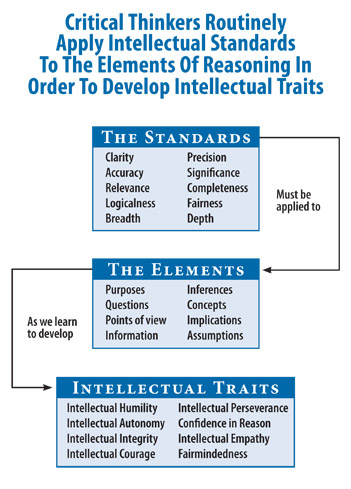
Our conception of critical thinking is based on the substantive approach developed by Dr. Richard Paul and his colleagues at the Center and Foundation for Critical Thinking over multiple decades. It is relevant to every subject, discipline, and profession, and to reasoning through the problems of everyday life. It entails five essential dimensions of critical thinking:
At the left is an overview of the first three dimensions. In sum, the elements or structures of thought enable us to "take our thinking apart" and analyze it. The intellectual standards are used to assess and evaluate the elements. The intellectual traits are dispositions of mind embodied by the fairminded critical thinker. To cultivate the mind, we need command of these essential dimensions, and we need to consistently apply them as we think through the many problems and issues in our lives.
The Elements of Reasoning and Intellectual Standards
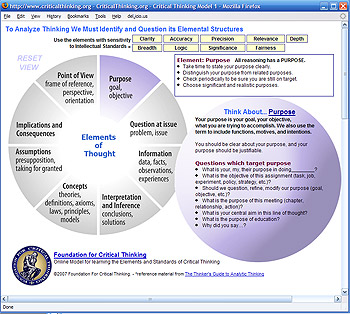
To learn more about the elements of thought and how to apply the intellectual standards, check out our interactive model. Simply click on the link below, scroll to the bottom of the page, and explore the model with your mouse.
Why the Analysis of Thinking Is Important If you want to think well, you must understand at least the rudiments of thought, the most basic structures out of which all thinking is made. You must learn how to take thinking apart. Analyzing the Logic of a Subject When we understand the elements of reasoning, we realize that all subjects, all disciplines, have a fundamental logic defined by the structures of thought embedded within them. Therefore, to lay bare a subject’s most fundamental logic, we should begin with these questions:

Going Deeper...

The Critical Thinking Bookstore
Our online bookstore houses numerous books and teacher's manuals , Thinker's Guides , videos , and other educational materials .
Learn From Our Fellows and Scholars
Watch our Event Calendar , which provides an overview of all upcoming conferences and academies hosted by the Foundation for Critical Thinking. Clicking an entry on the Event Calendar will bring up that event's details, and the option to register. For those interested in online learning, the Foundation offers accredited online courses in critical thinking for both educators and the general public, as well as an online test for evaluating basic comprehension of critical thinking concepts . We are in the process of developing more online learning tools and tests to offer the community.
Utilizing this Website
This website contains large amounts research and an online library of articles , both of which are freely available to the public. We also invite you to become a member of the Critical Thinking Community , where you will gain access to more tools and materials. If you cannot locate a resource on a specific topic or concept, try searching for it using our Search Tool . The Search Tool is at the upper-right of every page on the website.

National Geographic Education Blog
Bring the spirit of exploration to your classroom.

Ultimate Critical Thinking Cheat Sheet

18 thoughts on “ Ultimate Critical Thinking Cheat Sheet ”
Can I use this for company training? Is there a purchase/copyright.
Hi, Dale: You will need to contact the Global Digital Citizen Foundation to request permission to use this resource.
#hi, where can i get a chart?
Hi, Alma! The good folks at the Global Digital Citizen Foundation can help you here: https://globaldigitalcitizen.org/critical-thinking-skills-cheatsheet-infographic
Where is the actual critical aspect of the “thinking”? I would want to see, “What are the premises of the argument? Are they actually true? What evidence supports it and contradicts it? What other explanations might cause that result? What would be the result of the intervention? Does the proposed intervention actually address the problem identified? Is the problem identified the right problem?”
Thank you, PaulR! The fact that these basic rhetorical questions are missing from this infographic illustrates what is wrong with our current methods of “debate” on issues from climate change to healthcare.
Great post. Thanks
Excellent. Useful for the classroom.
Go to the previous page where you saw this graphic. There is a link above it that will allow you to download it.
I want to purchase
https://globaldigitalcitizen.org/critical-thinking-skills-cheatsheet-infographic
How may I obtain a copy? Thanks.
I’m interested in a copy too.
I’d like to get one too. How can one be purchased? Thank you
Is this a poster that can be purchased? How can I get a copy?
I would appreciate to know if someone have translated that Cheatsheet in French language
Leave a Reply Cancel reply

Article Categories
Book categories, collections.
- Academics & The Arts Articles
- Humanities Articles
Critical Thinking Skills For Dummies Cheat Sheet
Critical thinking skills for dummies.

Sign up for the Dummies Beta Program to try Dummies' newest way to learn.

The ingredients of a good critical thinker
A good critical thinker is composed of many ingredients. If you were building a critical thinker, à la Dr. Frankenstein, the following abilities and attributes would be needed:
Tolerance: Critical thinkers delight in hearing divergent views and enjoy a real debate.
Analytical skills: Critical thinkers don’t accept just any kind of talking. They want properly constructed arguments that present reasons and draw sound conclusions.
Confidence: Critical thinkers have to be a little bit confident to be able to examine views that others present — often people in authority.
Curiosity: Critical thinkers need curiosity. It may have killed the cat, but curiosity is the essential ingredient for ideas and insights.
Truth-seeking: Critical thinkers are on mission of “objective truth” — even if it turns out to undermine their own previously held convictions and long-cherished beliefs, and is flat against their self-interest.
Critical thinkers check the methodology
A key critical thinking skill is to be able to understand, and criticize, a writer’s methodology. When authors write books, conduct studies, or investigate a topic, they operate within a research paradigm (a theoretical framework) that affects how they view and investigate the subject. In formal academic studies, authors discuss the research paradigm upfront, and so that’s straightforward.
But more often, they leave the nature of the chosen paradigm in the background – as a given. So, the critical reader has to make a specific effort to work it out — and consider how the choice may skew the information reported.
Here are some useful questions to ask when looking at reports and research findings in the broad area of social science:
Theoretical or empirical: Is the text primarily concerned with ideas and theories or primarily based on observations and measurements? Most texts mix the two approaches, but critical readers need to identify which element should be the primary focus — even if the author seems confused!
Nomothetic or idiographic: These grand terms originate from ancient Greek ( nomos means law and idios means own or private) and refer to laws or rules that apply in general in contrast to ones that relate to individuals. Most social research is concerned with the nomothetic — the general case — because even when studying individuals, researchers usually hope to generalize the findings to everyone else. Always bear in mind the extent to which entirely valid observations about a particular case can safely be generalized.
Cause or correlation: So many people mix up these terms that the error has its own special name — cum hoc ergo propter hoc (Latin for “with this, therefore because of this”). In other words, putting things together whose connection is unproven. Take a medical example. A recent study of over a million women with breast cancer checked how many were cured by operations to remove suspected cancerous cells. It found that two-thirds were still alive ten years later.
It might seem natural to assume that the survival was due to the treatment, but the study also found that a control group of women given a mock operation (involving no removal of any cells) had an identical survival rate — plus greatly reduced risks or ill-effects from the procedures. Be aware that in experimental studies, there is a built-in bias exists to see causation even when, maybe, none exists.
Statistical answers or ideological hypotheses: A lot of research is based on probabilities. But working them out is something that even experienced researchers get wrong — perhaps applying the wrong statistical procedure to their data and generally overestimating the significance of their findings. Statistics aren’t simple plain-as-a-pikestaff facts; they’re created, misunderstood, and manipulated, which is why politicians and businesses sometimes seize on them in order to present a partial picture.
Tackling the question of assertibility
How do critical thinkers separate out cranky views that aren’t supported by evidence from reasonable theories that maybe worth serious consideration? This problem is sometimes called the assertibility question , because you’re asking what evidence allows you to assert that the claim is true.
Here’s a useful checklist for testing scientific theories:
How well does the idea fit with common sense? Is the idea nutty?
Who proposed the idea, and does the person have a built-in bias towards it being true?
Do proposers use statistics in an honest way? Do they back it up with references to other work that supports the approach?
Does the idea explain too much — or too little — to be useful?
How open are the proponents of the idea about their methods and data?
How many free parameters exist? That is, how many artificially decided settings that constrain and affect the theory?
How critical thinkers understand audiences
Critical thinkers evaluate the audience intended for all types of writing. The following are some general critical thinking approaches for particular types of writing aimed at specific audiences:
Academic studies and report writing: A summary usually starts this kind of writing and the main body of the report usually follows a set pattern: a section outlining the problem, a section that explains what people have already said about it and the all-important research methods section. This latter section is where the author explains why they’ve chosen to go about exploring the issue, whatever it may be, in a certain way. The bulk of the report then concerns an account of “what was found out” using this method, and the final sections concern the conclusions being drawn from this research.
Journal articles: These usually begin with a separate summary called the synopsis and the main body starts off by looking at the context of the issue and examining several possible positions, all taken with very detailed referencing. The final paragraph may well be called “conclusion,” and that’s what it is — drawing together the threads of what has been discussed earlier. The synopsis and the conclusion of many academic journal articles are very similar.
Magazine article: This may well start with a little story, or a teasing question, which is followed by a discussion that gets more detailed as you read on — and may well end up with a surprise at the end!
Newspaper article: At least conventionally, these start off by stating all the key points in the first line. The second paragraph then expands on this opening, and the article itself consists of the same again in more detail. Newspaper articles don’t save the best bit until last, because for practical production reasons, the end of the article is the first bit cut if space is a bit tight. Old-school journalists used to be told always to structure stories the same way: to say who, what, when, where, why, and how, in that order.
Don’t dismiss journalistic writing. It is structured, and it shares one important feature with academic writing – the search for impartiality.
“What you see is news, what you know is background, what you feel is opinion,” as American journalist Lester Markel said.
About This Article
This article is from the book:.
- Critical Thinking Skills For Dummies ,
About the book author:
Martin Cohen is a philosopher, editor and reviewer. His first book, 101 Philosophy Problems , has been published in a dozen languages and is now in its fourth edition.
This article can be found in the category:
- Humanities ,
- BIPOC—Complexities of Life in Color
- What Your Society Says About You
- Sociology For Dummies Cheat Sheet
- Anthropology For Dummies Cheat Sheet
- Archaeology For Dummies Cheat Sheet
- View All Articles From Category

Screen Menu

Screen Front Menu
Gced basic search form, quick search, resource type, you are here.
Critical thinking is clear, rational, logical, and independent thinking. It’s about improving thinking by analyzing, assessing, and reconstructing how we think. It also means thinking in a self-regulated and self-corrective manner. It’s thinking on purpose! The Critical Thinking Workbook helps you and your students develop mindful communication and problem-solving skills with exciting games and activities. It has activities that are adaptable to any grade level you want. The activity pages in the Critical Thinking Workbook are meant to be shared and explored. Use it as an electronic document or as worksheets. You can either print off the pages and use them as activity sheets, or you can edit them directly right in the document on your computer. There are also Answer Keys for the activities that need them provided at the back of the book.
Critical Thinking Exercises
- Writing Research Papers
- Writing Essays
- English Grammar
- M.Ed., Education Administration, University of Georgia
- B.A., History, Armstrong State University
Critical thinking is a skill that students develop gradually as they progress in school. While the skill becomes more important in higher grades, some students find it difficult to understand the concept of critical thinking .
The reason critical thinking can be difficult to grasp is because it requires students to set aside assumptions and beliefs to learn to think without bias or judgment.
Critical thinking involves suspending your beliefs to explore and question topics from a "blank page" point of view. It also involves the ability to distinguish fact from opinion when exploring a topic.
These exercises are designed to help develop critical thinking skills.
Critical Thinking Exercise 1: Tour Guide for an Alien
This exercise provides an opportunity to think outside your normal way of thinking.
Pretend that you have been assigned the task of conducting a tour for aliens who are visiting the earth and observing human life. You're riding along in a blimp, viewing the landscape below, and you float over a professional baseball stadium. One of the aliens looks down and is very confused by what he sees. You explain that there is a game going on and he asks several important questions.
- What is a game?
- Why are there no female players?
- Why do people get so excited about watching other people play games?
- What is a team?
- Why can't the people in the seats go down on the field and join in?
If you try to answer these questions fully, it will quickly become apparent that we carry around certain assumptions and values. We support a certain team, for instance, because it makes us feel like we're a part of a community. This sense of community is a value that matters to some people more than others.
Furthermore, when trying to explain team sports to an alien, you have to explain the value we place on winning and losing.
When you think like an alien tour guide, you are forced to take a deeper look at the things we do and things we value. Sometimes they don't sound logical from the outside looking in.
Critical Thinking Exercise 2: Fact or Opinion
Do you think you know the difference between fact and opinion? It's not always easy to discern. When you visit websites, do you believe everything you read? The abundance of available information makes it more important than ever for students to develop critical thinking skills. Additionally, it's an important reminder that you must use trustworthy sources in your school work.
If you don't learn the difference between fact and opinion, you may end up reading and watching things that continue to reinforce beliefs and assumptions you already own.
For this exercise, read each statement and try to determine whether it sounds like a fact or an opinion. This can be completed alone or with a study partner .
- My mom is the best mom on earth.
- My dad is taller than your dad.
- My telephone number is difficult to memorize.
- The deepest part of the ocean is 35,813 feet deep.
- Dogs make better pets than turtles.
- Smoking is bad for your health.
- Eighty-five percent of all cases of lung cancer in the U.S. are caused by smoking.
- If you flatten and stretch out a Slinky toy it will be 87 feet long.
- Slinky toys are fun.
- One out of every one hundred American citizens is color blind.
- Two out of ten American citizens are boring.
You will probably find some of the statements easy to judge but other statements difficult. If you can effectively debate the truthfulness of a statement with your partner, then it's most likely an opinion.
- Research Note Cards
- How Can You Stretch a Paper to Make it Longer?
- The Introductory Paragraph: Start Your Paper Off Right
- Understanding the Progressive Era
- What Is a Senior Thesis?
- How to Write a News Article That's Effective
- How Long Should My Paper Be?
- When to Cite a Source in a Paper
- Tips for Typing an Academic Paper on a Computer
- How to Narrow the Research Topic for Your Paper
- Unreliable Sources for Your Research Project
- Creating a Table of Contents
- Finding Sources for Death Penalty Research
- How to Write a 10-Page Research Paper
- What Is an Autobiography?
- Your Personal Essay Thesis Sentence
Critical Thinking Skills Worksheets Gifted Kids Math Workbooks Puzzle Workbooks for Kids - Updated Each Month!
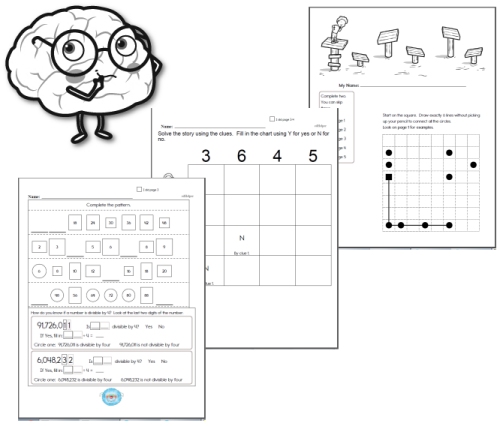

- Featured Articles
- Report Card Comments
- Needs Improvement Comments
- Teacher's Lounge
- New Teachers
- Our Bloggers
- Article Library
- Featured Lessons
- Every-Day Edits
- Lesson Library
- Emergency Sub Plans
- Character Education
- Lesson of the Day
- 5-Minute Lessons
- Learning Games
- Lesson Planning
- Subjects Center
- Teaching Grammar
- Leadership Resources
- Parent Newsletter Resources
- Advice from School Leaders
- Programs, Strategies and Events
- Principal Toolbox
- Administrator's Desk
- Interview Questions
- Professional Learning Communities
- Teachers Observing Teachers
- Tech Lesson Plans
- Science, Math & Reading Games
- Tech in the Classroom
- Web Site Reviews
- Creating a WebQuest
- Digital Citizenship
- All Online PD Courses
- Child Development Courses
- Reading and Writing Courses
- Math & Science Courses
- Classroom Technology Courses
- A to Z Grant Writing Courses
- Spanish in the Classroom Course
- Classroom Management
- Responsive Classroom
- Dr. Ken Shore: Classroom Problem Solver
- Worksheet Library
- Highlights for Children
- Venn Diagram Templates
- Reading Games
- Word Search Puzzles
- Math Crossword Puzzles
- Geography A to Z
- Holidays & Special Days
- Internet Scavenger Hunts
- Student Certificates
Newsletter Sign Up
Lesson Plans
- General Archive
- Health & Safety
- Interdisciplinary
- Language Arts
- PE & Sports
- Social Science
- Special Ed & Guidance
- Special Themes
- Top LP Features
- Article Archive
- User Submitted LPs
- Box Cars Math Games
- Every Day Edits
- Five Minute Fillers
- Holiday Lessons
- News for Kids
- ShowBiz Science
- Student Engagers
- Work Sheet Library
- More LP Features
- Calculator Lessons
- Coloring Calendars
- Friday Fun Lessons
- Math Machine
- Month of Fun
- Reading Machine
- Tech Lessons
- Writing Bug
- All Work Sheets
- Critical Thinking Work Sheets
- Animals A to Z
- Backpacktivities
- EveryDay Edits
- Hunt the Fact Monster
- It All Adds Up Math Puzzles
- Make Your Own Work Sheets
- Math Cross Puzzles
- Mystery State
- Math Practice 4 You
- Phonics Word Search Puzzles
- Readers Theater Scripts
- Sudoku Puzzles
- Vocabulous!
- Back to School
- Back to School Archive
- Icebreaker Activities
- Preparing for the First Day
- Ideas for All Year
- The Homework Dilemma
- First Year Teachers
- Don't Forget the Substitute
- More Great Ideas for the New School Year
- Early Childhood
- Best Books for Educators
- Assessments
- Award Certificates
- Bulletin Board Resources
- Classroom Organizers
- Graphic Organizers
- Newsletters
- Parent Teacher Communications
- More Templates
Search form
Work sheet library: critical thinking: grades k-2.
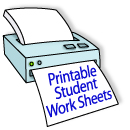
Visit Education World's Work Sheet Library for a wide variety of free printables for use across the curriculum and across the grades.
Balance Benders Given that = ? on a balance scale, then which of the following simple algebraic expressions is also true? (Grades 2-4)
Following Directions Follow the directions to mark the appropriate shapes. (Grades K-2)
Combining Attribute Blocks Determine which figures can be made by combining two different attribute block shapes. (Grades K-2)
Naming Foods: Matching Trace and copy each food name. Then draw a line from each food to its name. (Grades K-2)
Can You Find Me? (#1) Use the rhyming clues to determine which picture the rhyme describes. (Grades K-2)
Can You Find Me? (#2) Use the rhyming clues about words that begin with the /f/ sound to find one other /f/ word.
Lemur Think about lemurs and birds, then finish the picture of the lemur. (Grades K-2)
Camel Think about temperatures (warmer, colder) and finish the picture of the camel. (Grades K-2)
Non-Poisonous Snake Figure out the shape of the snakes cage and then complete the picture of the snake. (Grades K-2)
Poisonous Snake Figure out the shape of the snakes cage and then complete the picture of the snake. (Grades K-2)
An Indecent Chicken? Read the true story. Then make an inference based on the evidence in the story. (Grades 2-4)
Push and Pull This hands-on activity with common objects teaches the concept of force. (Grades K-2)
Rhyme and Reason (#1) Can you figure out the subjects of these simple rhymes? (Grades K-2)
Rhyme and Reason (#2) Can you figure out the subjects of these simple rhymes? (Grades K-2)
Rhyme and Reason (#3) Can you figure out the subjects of these simple rhymes? (Grades K-2)
Rhyme and Reason (#4) Can you figure out the subjects of these simple rhymes? (Grades K-2)
Rhyme and Reason (#5) Can you figure out the subjects of these simple rhymes? (Grades K-2)
Classifying: Color and Shape Using two different colors of interlocking cubes, make two copies of each figure. (Grades K-2)
Verb Tenses Use the words in the box to write the correct verb tense for each sentence. (Grades K-2)
Syllables Use the clues about syllables to reason each animals name. (Grades K-2)
High Frequency Words: Colors Circle the color words and then put them in alphabetical order. (Grades 1-2)
Math Analogies Complete each math analogy by drawing the correct shape. (Grades K-2)
Sets Circle each set that has three objects in it. (Grades K-2)
Math Reasoning and Baseball How many total bases do you touch if you hit a single, double, triple, and home run? (Grades K-2)
Fruit Tree Addition Count the fruit on the trees, then write the simple sum. (Grades K-2)
Metric Units: Temperature Choose the temperature (Celsius) that matches each activity. (Grades 1-3)
Four Houses Use the clues and the chart to help you figure out which house belongs to each person. (Grades K-2)
Four Cats Use the clues and the chart to help you figure out which cat belongs to each family member. (Grades K-2)
Which Is Which? Use the clues and your reasoning skills to figure out the answer to each question. (Grades K-2)
An Old-Fashioned Saturday Read the story about collecting sap from maple trees, then answer the questions. (Grades 1-3)
Read and Find Comprehension Read the list of 12 words. Can you find all 12 things in the picture? (Grades K-2)
Time and Measurement Think hard about these tricky questions. (Grades 2-4)
Word Matrix Fill in the boxes of each column with words belonging to that group. (Grades K-2)
Brain Ticklers Figure out the number and the family names. (Grades K-2)
Thinker Doodles: Bunnies Complete the bunny drawings and then color them as the directions suggest. (Grades K-2)
Thinker Doodles: Dinosaurs Complete the dinosaur drawings and then color them as the directions suggest. (Grades K-2)
Mazes Pretest Draw a line from the person to the house. Remember not to cross any lines. (Grades K-2)
Visual Figure Ground Activity Follow directions. Dont let the confusing picture confuse you! (Grades K-2)
Find the Matching Figure Match the figures. Look closely -- the matching figures may be hiding. (Grades K-2)
Education World® Copyright © 2010 Education World
EW Lesson Plans

EW Professional Development
Ew worksheets.










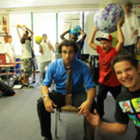


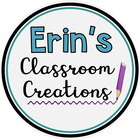
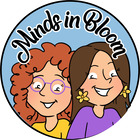

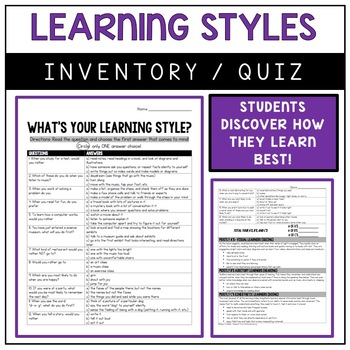

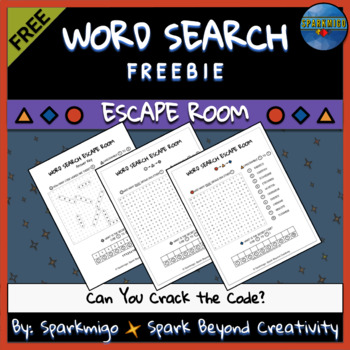

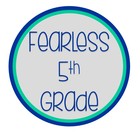


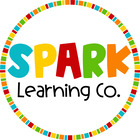

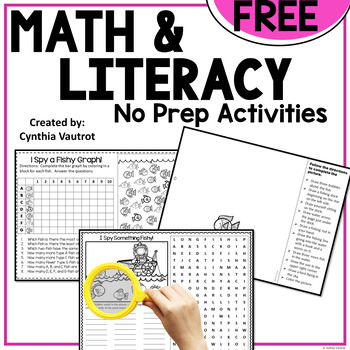
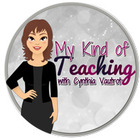

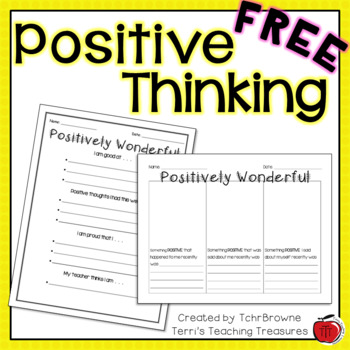

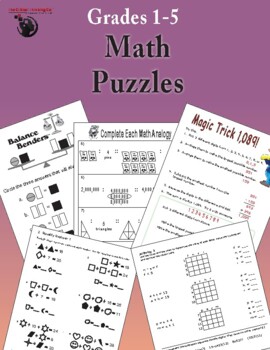

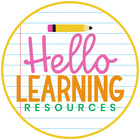
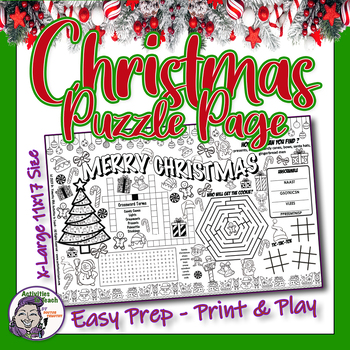

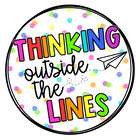

COMMENTS
The Critical Thinking Workbook
81 Fresh & Fun Critical-Thinking Activities
Brain Teasers - A great way to stimulate thinking. Don't worry, they come complete with answer keys. Compare and Contrast - Students examine differences and similarities in a variety situations. Dictionary Practice Worksheets - Practice your dictionary skills. Fact And Opinion - Students determine the validity of a body of work.
Yes, you can use your dictionary. (Grades 5-8) Complete this activity about words that have /phone/ as their root. (Grades 3-5) 100 ready-to-print student worksheets for Grades 3-5. Use these worksheets with your students to build a wide variety of critical thinking skills.
Aspiring Thinker's Guide to Critical Thinking
The activity pages in the Critical Thinking Workbook are meant to be shared and explored. Use it as an electronic document or as worksheets. You can either print off the pages and use them as activity sheets, or you can edit them directly right in the document on your computer. There are also Answer Keys for the activities that need them ...
Critical Tillnklng Want to exercise critical thinking skills? Ask these questions whenever you discover or discuss new information. These are broad and versatile questions that have limitless applications! 'Who What Where When Why How benefits from this? is this harmful to? makes decisions about this? is most directly affected?
The Miniature Guide to Critical Thinking: Concepts & Tools
About These 15 Worksheets. Critical thinking is the ability to analyze, evaluate, and synthesize information, ideas, and arguments in a thoughtful and systematic manner. These worksheets provide exercises, questions, and prompts that encourage learners to engage in higher-order thinking and develop their abilities to assess, reason, and make ...
How to Develop Critical Thinking Skills
Critical Thinking Special Education Worksheets for Teaching Idioms in Context. Adulting Life Skills Resources. ... critical thinking, and focusing skills. Great to help keep students busy w. 3 rd - 12 th, Higher Education, Adult Education. Back to School, Critical Thinking, Numbers. FREE. Rated 4.62 out of 5, based on 42 reviews. 4.6 (42) View ...
What Are Critical Thinking Skills and Why Are They ...
Critical Thinking: Where to Begin
18 thoughts on "Ultimate Critical Thinking Cheat Sheet". Dale Ignatiussays: 02/24/2023 at 6:28 pm. Can I use this for company training? Is there a purchase/copyright. Reply. National Geographic Education Staffsays: 02/27/2023 at 9:51 am.
Critical Thinking Skills For Dummies Cheat Sheet
Critical thinking is clear, rational, logical, and independent thinking. It's about improving thinking by analyzing, assessing, and reconstructing how we think. It also means thinking in a self-regulated and self-corrective manner. It's thinking on purpose! The Critical Thinking Workbook helps you and your students develop mindful communication and problem-solving skills with exciting ...
These escape room games are designed to help exercise problem-solving, critical thinking, and focusing skills. It is a great way to keep the students busy and help build/improve essential skills. There are 4 Fun Unique Levels of the Maze Run to choose from. Each level is different and as the levels increa.
Critical Thinking Exercise 1: Tour Guide for an Alien. This exercise provides an opportunity to think outside your normal way of thinking. Pretend that you have been assigned the task of conducting a tour for aliens who are visiting the earth and observing human life. You're riding along in a blimp, viewing the landscape below, and you float ...
Teaching critical thinking is crucial for student success in core subject areas, and it can begin as young as preschool through the introduction of worksheets featuring games and puzzles. Critical thinking skills are necessary in the 21st century, and these worksheets cover a wide range of logic puzzles and problems, Sudoku, Masyu, and Hidato puzzles, word problems and brain teasers of all ...
Work Sheet Library: Critical Thinking
Welcome to Education World's Work Sheet Library. In this section of our library, we present more than 100 ready-to-print student work sheets organized by grade level. Click on a grade level folder below to find a library of work sheets that you can use with your students to build a wide variety of critical thinking skills. All the work sheets ...
Free Critical Thinking Addictive Math Puzzle Activities for Grades 1-5. Created by. The Critical Thinking Co. This 59-page ebook for Grades 1-5 is a sample collection of our most popular quick, fun thinking math puzzles. The wide variety of activities build deductive, inductive (inferential), and creative thinking skills in mathematics.
Share via: Critical thinking, as described by Oxford Languages, is the objective analysis and evaluation of an issue in order to form a judgement. Active and skillful approach, evaluation, assessment, synthesis, and/or evaluation of information obtained from, or made by, observation, knowledge, reflection, acumen or conversation, as a guide to ...